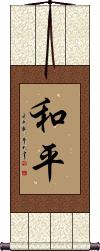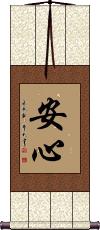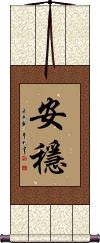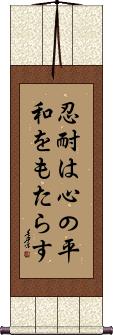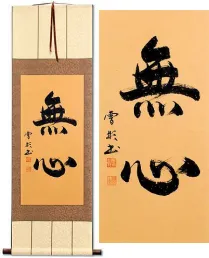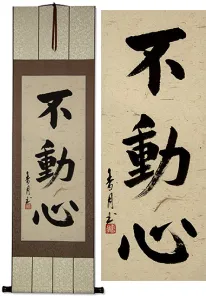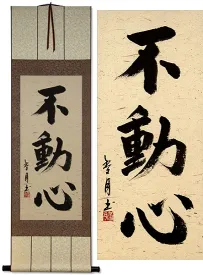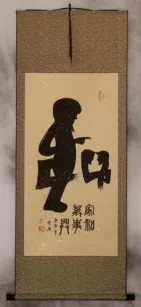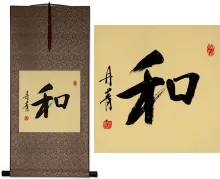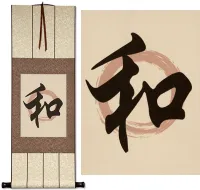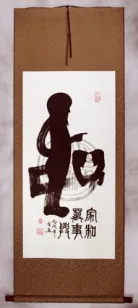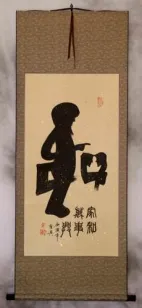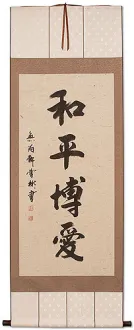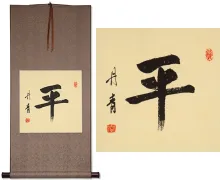Many custom options...
And formats...

Peace of Mind in Chinese / Japanese...
Buy a Peace of Mind calligraphy wall scroll here!
Personalize your custom “Peace of Mind” project by clicking the button next to your favorite “Peace of Mind” title below...
Peace of Mind
和平 is the Chinese order for these two characters, which means peace but can also be translated as amicability, specifically, or mildness. 和平 is often translated as a simple way to say “peace of mind.” This combination is used in Korean Hanja to mean “peace and harmony.”
Alone, the first character means peace and harmony.
The second character means balance when read by itself.
Note: 和平 are often seen in the opposite order in Japanese with the same meaning (You'll sometimes find them in this order in Japan, so either way is OK).
Peace of Mind
(five-character version)
內心的寧靜 is the long way to express the idea of “peace of mind” in Chinese.
The first two characters mean heart or “innermost being.”
The middle character is a connecting modifier.
The last two characters mean peace, tranquility, or serenity.
Some may also translate this as “inner peace,” but I like our other inner-peace options for that idea.
This kind of makes sense in Korean but will have an archaic read - even by those who can understand Korean Hanja.
Peaceful Heart / Peace of Mind / Calm Mind
安心 can be defined as relief, peace of mind, feeling at ease, to be relieved, to set one's mind at rest, and easiness.
安心 is a nice word that encompasses great meanings within just two characters. Some of the other meanings include pacifying, settling the mind, and peace of mind. It's also the idea of feeling a sense of security, safety, and confidence in your state of well-being.
This can be used by everyone, but some consider it to be a Buddhist concept (You'll find it in your Zen dictionary).
Note: Can be romanized as Anshin or Anjin in Japanese.
Stable - Mind at Peace
安穩 can mean a steady, stable, sedate, and calm mind.
Other translations include “body and mind at rest,” or “peace and comfort.”
Patience Yields Peace of Mind
Patience Brings Peace of Mind
This in-stock artwork might be what you are looking for, and ships right away...
Gallery Price: $200.00
Your Price: $118.88
Gallery Price: $200.00
Your Price: $118.88
Gallery Price: $202.00
Your Price: $111.88
Gallery Price: $106.00
Your Price: $58.88
Gallery Price: $79.00
Your Price: $43.88
Gallery Price: $40.00
Your Price: $16.88
Gallery Price: $90.00
Your Price: $49.88
Blemished Peace / Harmony Special Calligraphy Scroll
Discounted Blemished
Gallery Price: $53.00
Your Price: $29.00
Gallery Price: $53.00
Your Price: $29.00
Gallery Price: $265.00
Your Price: $99.88
Gallery Price: $65.00
Your Price: $39.88
Not the results for Peace of Mind that you were looking for?
Below are some entries from our dictionary that may match your Peace of Mind search...
| Characters If shown, 2nd row is Simp. Chinese |
Pronunciation Romanization |
Simple Dictionary Definition |
安心 see styles |
ān xīn an1 xin1 an hsin anjin あんじん |
More info & calligraphy: Peaceful Heart / Peace of Mind / Calm Mind{Buddh} obtaining peace of mind through faith or ascetic practice; (female given name) Anshin To quiet the heart, or mind; be at rest. |
安穩 安稳 see styles |
ān wěn an1 wen3 an wen an non |
More info & calligraphy: Stable - Mind at Peace安隱 Body and mind at rest. |
平静 see styles |
heisei / hese へいせい |
(noun or adjectival noun) (1) calm; peace; serenity; tranquility; tranquillity; (noun or adjectival noun) (2) composure; equanimity; presence of mind |
放心 see styles |
fàng xīn fang4 xin1 fang hsin houshin / hoshin ほうしん |
More info & calligraphy: No Worries(n,vs,vi) (1) absentmindedness; (n,vs,vi) (2) peace of mind absentmindedness |
踏實 踏实 see styles |
tā shi ta1 shi5 t`a shih ta shih |
More info & calligraphy: Realistic / Practical |
奢摩他 see styles |
shē mó tā she1 mo2 ta1 she mo t`a she mo ta shamata |
More info & calligraphy: Samatha |
安心立命 see styles |
ān xīn lì mìng an1 xin1 li4 ming4 an hsin li ming anshinritsumei; anjinryuumei; anjinryuumyou; anjinritsumei / anshinritsume; anjinryume; anjinryumyo; anjinritsume あんしんりつめい; あんじんりゅうめい; あんじんりゅうみょう; あんじんりつめい |
More info & calligraphy: Spiritual Peace / Enlightened Peacespiritual peace and realization of enlightenment |
眉を開く see styles |
mayuohiraku まゆをひらく |
More info & calligraphy: Let It Be / Be Relieved |
休心 see styles |
xiū xīn xiu1 xin1 hsiu hsin kokoro wo yasumu きゅうしん |
(noun/participle) peace of mind; relief to rest the mind |
休神 see styles |
kyuushin / kyushin きゅうしん |
(noun/participle) peace of mind; relief |
円相 see styles |
ensou / enso えんそう |
{Buddh} circle painted with a single stroke in Zen calligraphy (representing the perfect peace of mind) |
安樂 安乐 see styles |
ān lè an1 le4 an le anraku あんらく |
peace and happiness (surname) Anraku Happy; ease (of body) and joy (of heart) 身安心樂. |
安神 see styles |
ān shén an1 shen2 an shen yasukami やすかみ |
to calm (soothe) the nerves; to relieve uneasiness of body and mind (adj-na,n,vs) relief; peace of mind; (surname) Yasukami |
立命 see styles |
ritsumei / ritsume りつめい |
peace of mind |
七最勝 七最胜 see styles |
qī zuì shèng qi1 zui4 sheng4 ch`i tsui sheng chi tsui sheng shichi saishō |
The seven perfections, see唯識論, 9. 安住最勝 Perfect rest in the bodhisattva nature. 依止最勝 perfect reliance on, or holding fast to the great bodhi (awakened mind). 意果最勝 perfect resultant aim in-pity for all 事業最勝 Perfect in constant performance. 巧便最勝 Perfect in able device (for spiritual presentation). 廻向最勝 Perfect direction towards the highest bodhi. 滿淨最勝 Perfect purity and peace. |
四安樂 四安乐 see styles |
sì ān lè si4 an1 le4 ssu an le shi anraku |
(四安樂行) The four means of attaining to a happy contentment, by proper direction of the deeds of the body; the words of the mouth; the thoughts of the mind; and the resolve (of the will) to preach to all the Lotus Sutra. |
安らぎ see styles |
yasuragi やすらぎ |
(noun - becomes adjective with の) peace (of mind); tranquility; tranquillity; serenity |
寂靜法 寂静法 see styles |
jí jìng fǎ ji2 jing4 fa3 chi ching fa jakujō hō |
Ceremonies for restoring peace from calamity. |
気休め see styles |
kiyasume きやすめ |
mere consolation; temporary peace of mind |
気安め see styles |
kiyasume きやすめ |
mere consolation; temporary peace of mind |
煩惱礙 烦恼碍 see styles |
fán nǎo ài fan2 nao3 ai4 fan nao ai bonnō ge |
The obstruction of temptation, or defilement, to entrance into nirvāṇa peace by perturbing the mind. |
気休めに see styles |
kiyasumeni きやすめに |
(adverb) for peace of mind |
Variations: |
kyuushin / kyushin きゅうしん |
(n,vs,vi) (See 安心・あんしん) peace of mind; relief |
Variations: |
kiyasume きやすめ |
mere consolation; temporary peace of mind |
Variations: |
anshin あんしん |
(n,adj-na,vs,vi) relief; peace of mind |
Variations: |
kyuushin / kyushin きゅうしん |
(n,vs,vi) (used mainly in letters) peace of mind; relief |
Variations: |
kigasumu きがすむ |
(exp,v5m) to be satisfied; to find peace of mind; to feel good |
Variations: |
hitoanshin ひとあんしん |
(n,vs,vi) feeling of relief (for the time being); peace of mind (for now) |
Variations: |
kiyasume きやすめ |
mere consolation; temporary peace of mind |
Variations: |
anshin あんしん |
(n,adj-na,vs,vi) peace of mind; relief; (sense of) security; safety; assurance; confidence |
Click here for more Peace of Mind results from our dictionary
The following table may be helpful for those studying Chinese or Japanese...
| Title | Characters | Romaji (Romanized Japanese) | Various forms of Romanized Chinese | |
| Peace of Mind | 和平 | wa hei / wahei | hé píng / he2 ping2 / he ping / heping | ho p`ing / hoping / ho ping |
| Peace of Mind | 內心的寧靜 内心的宁静 | nèi xīn de níng jìng nei4 xin1 de ning2 jing4 nei xin de ning jing neixindeningjing | nei hsin te ning ching neihsinteningching |
|
| Peaceful Heart Peace of Mind Calm Mind | 安心 | an shin / anshin | ān xīn / an1 xin1 / an xin / anxin | an hsin / anhsin |
| Stable - Mind at Peace | 安穩 安稳 | an non / annon | ān wěn / an1 wen3 / an wen / anwen | |
| Patience Yields Peace of Mind | 能忍自安 | néng rěn zì ān neng2 ren3 zi4 an1 neng ren zi an nengrenzian | neng jen tzu an nengjentzuan |
|
| Patience Brings Peace of Mind | 忍耐は心の平和をもたらす | nintai wa kokoro no heiwa o motarasu | ||
| In some entries above you will see that characters have different versions above and below a line. In these cases, the characters above the line are Traditional Chinese, while the ones below are Simplified Chinese. | ||||
Successful Chinese Character and Japanese Kanji calligraphy searches within the last few hours...
